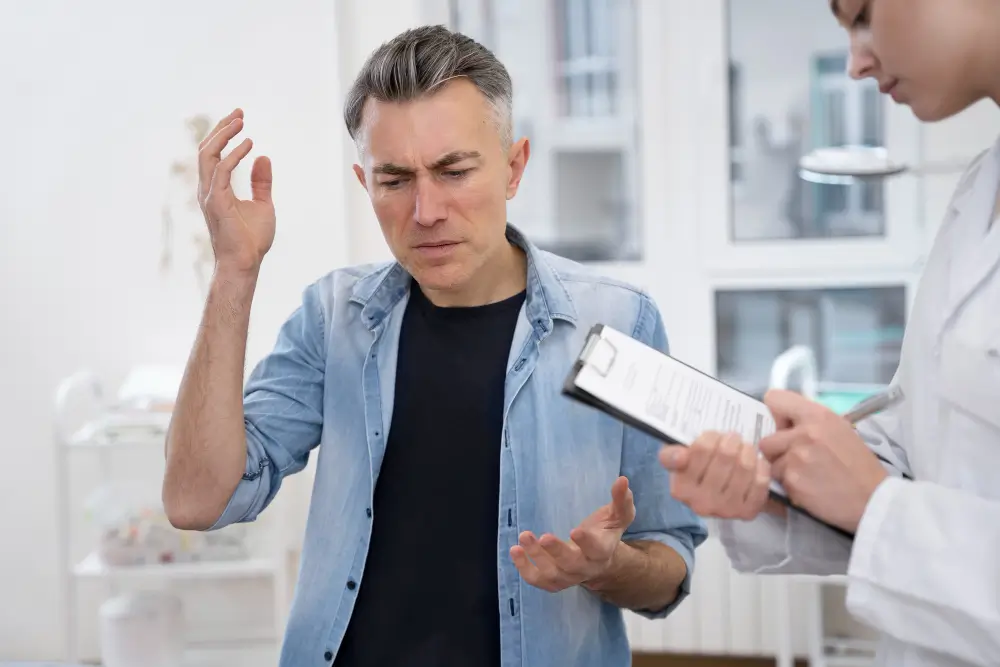
How Does Ketamine Therapy Work?
Ketamine Assisted Therapy (KAT) is gaining recognition across the US to provide immediate relief to patients with treatment-resistant depression, trauma, and other mental health conditions.
Ketamine affects a number of different receptors in both the brain and body. It can support the growth of new neural connections and increase brain plasticity.
Under clinical supervision, patients are given a low sub-anesthetic dose of ketamine, to induce a hypnotic-like state. It causes a short, but intense experience, that can help patients gain insights into their cognition, motivation, emotions and behavior.
Ketamine-Assisted Therapy Timeline
KAT is often administered in a few sessions, although some patients have found long-term relief after just one session. Each session lasts anywhere from 40 minutes to 2 hours, depending on the individual.
Unlike typical antidepressants or mental health medications, ketamine infusions often provide immediate effects. Working with your mental health professional and the medical staff administering the ketamine infusion, there are a few things to be aware of before, during, and after your session.
Before Treatment
Before your KAT session, prepare your mind and body. This can help prevent side effects and also reap as many benefits as you can from the treatment.
Ketamine sessions need to be approved by a mental health professional or licensed doctor accredited for the administration of ketamine.
At your initial consultation, your provider will give you a checklist to prepare before your session.
Some helpful advice to follow for preparing for your first KAT session include:
Get a good night’s rest in order to easily relax during your session and focus your mind on the experience.
Don’t eat or drink anything heavy 6 hours before your treatment. Sometimes ketamine can cause nausea or vomiting, so it’s best to not have much in your stomach.
Prep your mind with meditations, positive affirmations, or your favorite playlist. Avoid consuming violent or depressing content.
Dress in comfortable clothes and try to wear short sleeves as the ketamine IV will be placed in your arm. If you get cold, soft blankets may be provided.
Make sure to have a ride for your appointment. It’s recommended not to drive for the remainder of the day after your KAT session.
During Treatment
Ketamine sessions can last anywhere from 40 minutes to 2 hours, depending on your condition being treated and your individual medical history.
You will relax in a large, comfy chair in a dark room. Some patients prefer to use eye masks to enhance the darkness, while others prefer to keep their eyes open.
Blankets, pillows or anything else you need for comfort can be provided to help promote relaxation. Patients are welcome to listen to music (with or without headphones).
The nurse or doctor administering the ketamine will place an IV in your arm. Your vital signs will be monitored during the KAT session. Side effects are uncommon, but sometimes ketamine can cause nausea. An anti-nausea medication can be administered to help ease the stomach.
Ketamine treatment will not cause you to lose consciousness, and many patients have described it as a “warm out of body experience”.
After Treatment
Patients will regain full mental clarity minutes after the end of their treatment. Some patients feel a bit tired and relaxed, while others feel a boost of energy.
Patients are encouraged to have an open discussion about their thoughts and experience after the session is finished. It is important to have a plan of transportation or support person that can drive you to and from your session.
We also recommend getting a good sleep the night after your session.
Understanding the Healing Process
Although ketamine offers immediate relief of symptoms, integrating the insights from your sessions into your daily life is essential to a long-lasting recovery. Ketamine can re-wire pathways in the brain to help stop negative thoughts, flashbacks, emotional issues and other mental health symptoms.
During your ketamine session you may have profound insights about your life or the reason behind certain thoughts, feelings and behaviors. Integrating these into your life is an important part of the healing process.
Ketamine Therapy Aftercare
Your mental health provider will follow up with you after your ketamine sessions as a “check-in” to see how your symptoms are, and if future sessions are necessary. Keeping a journal to track your mood and thoughts that occur throughout the day is recommended to monitor your progress.
Some patients bring a journal with them to their actual session to be able to write down any insights they learn.
How to Make The Most Out of Your Treatment
Even if patients are feeling relief from their symptoms, it’s still highly recommended to continue standard treatment or therapy with their mental health provider.
Ketamine can increase motivation and positive mood. Use this to your advantage and let it help you build healthy routines and mental health care practices. Some ideas include:
-
- Get movement daily or develop an exercise plan
-
- Eat a balanced diet
-
- Meditate
-
- Journal
-
- Get creative (art, music, dance)
-
- Listen to positive affirmations
-
- Build a positive support system surrounded by trusted loved ones
The benefits of ketamine are continuing to be acknowledged for its ability to treat a number of severe mental health problems.
Sources
Wu, H., Savalia, N. K., & Kwan, A. C. (2021). Ketamine for a Boost of Neural Plasticity: How, but Also When?. Biological psychiatry, 89(11), 1030–1032.
How ketamine relieves symptoms of depression. 2019. National Institute of Health.



